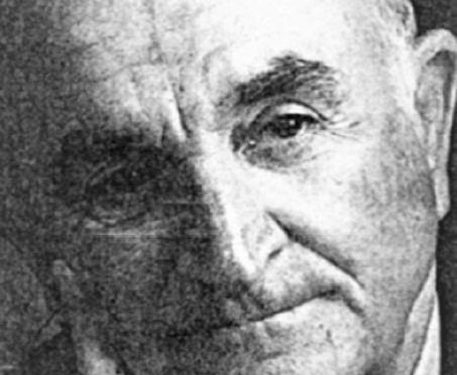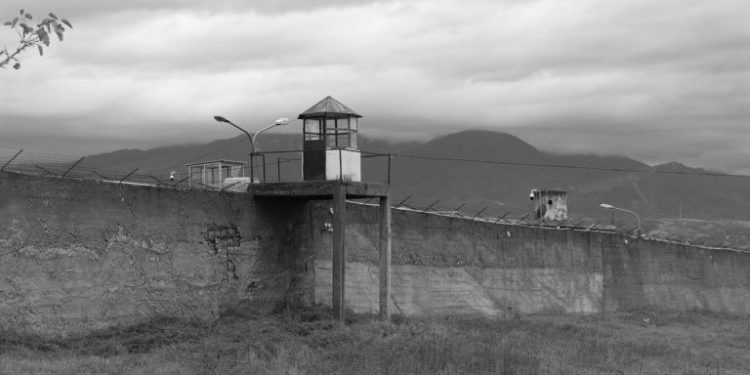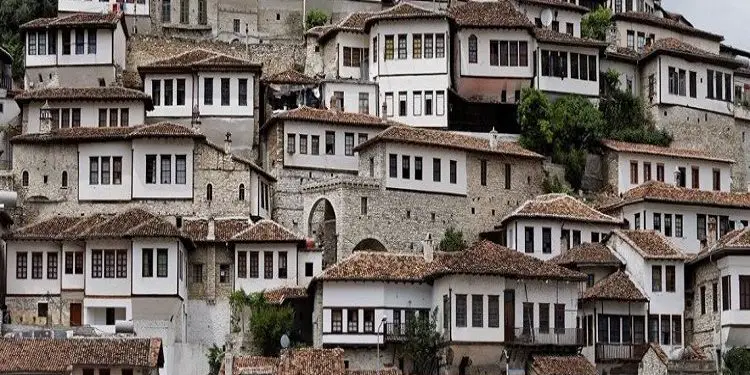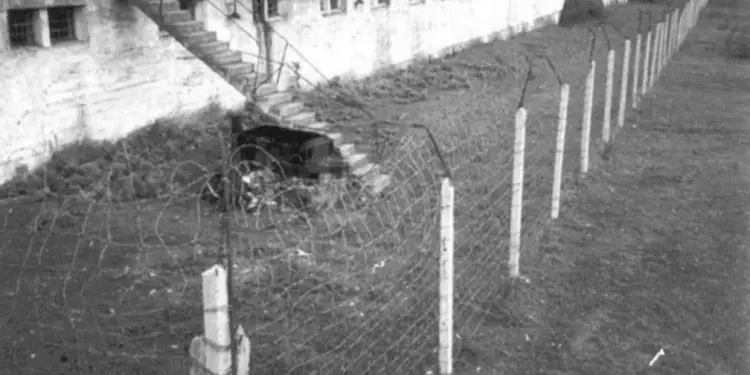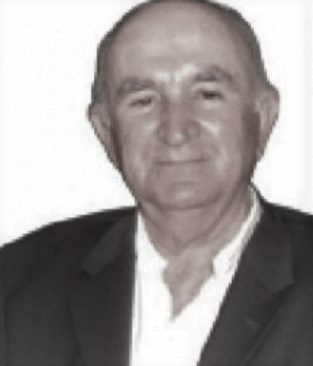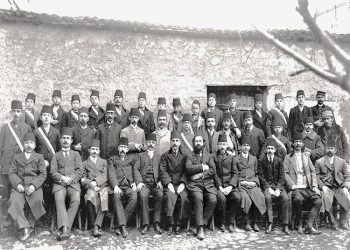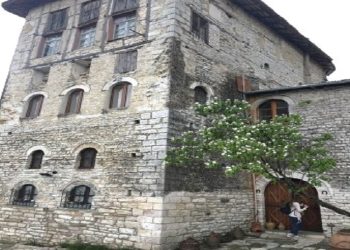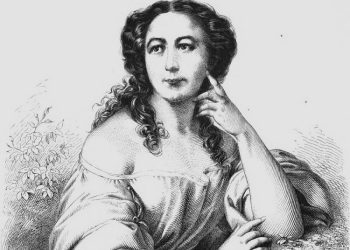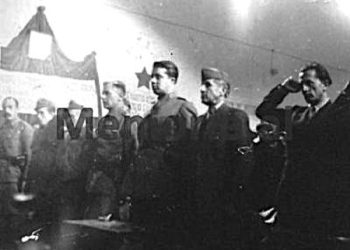By Luan Muftiu
Second part
Memorie.al / Luan Muftiu was born in Berat in 1933 and was orphaned at an early age, as his father, a respected patriot and supporter of the “National Front”, was sentenced to be shot in 1945, but later, his life was spared and died after a few years in the Burrel prison where he was serving his sentence. Luani’s mother and she did not make it out of the psychiatric hospital alive, where she was mercilessly dumped. Amidst the suffering that followed him day by day, with a lot of effort, Luani managed to continue the Pedagogical school in Berat and started working as a teacher. But during all this time he was under the constant surveillance of the State Security bodies and in 1975, he was arrested and sent to the investigator. “What have I done”? – Luani would ask the investigator…! “…You are butchered meat that we keep in the refrigerator, when we need to take it, to punish it so that those young people who sing canzonettas can see it”, – answered the investigator. He was sentenced to 10 years and sent to Spaç, where he served the entire sentence. After 1990, he came to Tirana where he took an active part in democratic processes and engaged in various writings mainly in the newspaper “Liria”, organ of the Association of Former Convicts and Political Persecuted of Albania. Luan Muftiu also dealt with literature, studying the genre of the story, which he was very passionate about. He has published an essay entitled “Under the communist territory”, as well as translated “Aphorisms never described” by Oscar Wilde and “White Nights” by Dostoevsky.
Continues from last issue
THE TRIAL OF DOSTOYEVSKY
Orphaned by both parents since my early childhood, I never knew how to properly build my relationships with others. I remained, so to speak, the same beggar of human love, because the orphan, without realizing it, will seek all the time to fill in the soul the lack created by the loss of the parent. And the older I got, the more I felt like a boat in a choppy sea. I don’t know how I got hold of a book by F.M. Dostoyevsky, and from that day I not only remained his captive, but it seemed to me that I no longer had that first thirst to grab any advice from others.
Even as if a secret voice told me that others should have consulted with me. And how could I guess how dearly I would pay for his influence, especially reading that colossus at an age where experience prevents you from separating dreams from reality. That genius is useful, insofar as we are able to feed our souls with their nectar.
However, I do not regret that I read this author with passion, when I think that without him, who would have ended up my ship, in the conditions of a dictatorship that destroyed even its sons. Don’t parents themselves sometimes harm their children, fulfilling their every whim and convincing them that they are like no other in the world?
And what fault do I put on Dostoyevsky because I didn’t have anyone to teach me that I shouldn’t read it at that age and in the conditions of a social system that would punish you even if you loved them and people loved you without the permission of the party? At first I was surprised even at myself. How is it possible that I was not angry with those who mocked me, or those who looked down on me because it seemed to them that I stood below them?
How could I feel sorry for those who were despised by all mankind, even when for this pity I suffered insults from some proud people? They all seemed good to me, as well as evil. I lay awake at night to find out which one was more good than evil.
And, looking at others with this eye, I became good to everyone; although I felt that no one loved and valued me, as I thought. In a word, Dostoevsky had put me in a big predicament, which no one in the world has been able to solve until today; how to make everyone love you? Is it possible for everyone to love you? And why did you want everyone to love you, if you have the strength to love them?
I was obsessed with the idea that everything in the world can be achieved through the power of love. Even, through it you can force even those who have wronged you to repent and worship you for saving them from the clutches of hatred. But when I imagined her innocently shot by the communists and the poor mother who hanged herself with her wedding shawl when her brother and nephew were tortured to death, my entire fortress collapsed and I lived for weeks in silence, seeing every man as a bearer of evil and wickedness, as much as Dostoevsky seemed to me to be a great saboteur, who aims to justify the devil to accuse the angels.
And I tried without being able to enter the universe of his work, that endless world of stars, which has its own laws of gravity. And in that darkness I became ordinary, I broke away from Dostoevsky’s tyranny and started to love and hate people like everyone else did.
But over time I felt that I had to treat others like a hypocrite. Because in a dictatorship you can neither love nor hate as you wish if this goes against the scale that the state has set to love or hate people. That’s why I had to leave people, in order to love them or justify them, contemplating them.
But again, one question did not leave me alone: what about those who deserve to be hated? Trying to solve this issue, Dostoevsky helped me, advising me not to deal with them, as long as I had no chance to fix them. So at least I did not become enmity with those who did not blame me for my misery, although they treated me as the state wanted.
I once had a kind of illusion, especially when the communists softened their ferocity, but over time, I became convinced that this was just a tactic of theirs, because they did this softening not out of generosity, but out of the fear that all tyrants have when you stab the slaves to the bone so that they say about the one who dies: “He saved”.
Those designated as “victims” who accepted this type of temporary amnesty, even though they knew they would be “slaughtered” later, benefited from this climate. But it is surprising with misery, who, even when he knows what awaits him, does not accept evil for himself! This is how we threw the dance into the wolf’s mouth, just as communism said about it. All sacrifices who hoped it would never be our turn to be sacrificed.
It so happened that in one of these periods of hypocritical softening, I was appointed a teacher in a distant village, since I had just finished the Pedagogical school, the only secondary school that our city had at that time. It was indeed a happiness to have where to build that world of astonishing beauty to inspire the great constructors of human souls, as in my case F. M. Dostoyevsky was.
Now I, hungry for a bit of parental love, would become a second parent to innocent creatures vegetating on a harsh rock that was the communist dictatorship. Now no one could stop me from setting up a beehive of human love within that crippling program where the children could feel how big the world of kindness is.
And surprise! How much the human soul feels sincerity and nobility! But communism, which rises above hatred, cannot stand for people to love each other. Because human love rises above freedom, that’s why communism is horrified by compassion, pity, fraternity, that’s why he condemned every preacher of kindness and generosity. Just when I had reached the apogee of the good opinion of others towards me, even those who did not understand why they had to look down on you, suddenly comes a clear order to put “irons” on my hands.
Not wanting to tire the reader with the terrible stories of the kidnapping that the State Security did to me, how he tried to force me to plead guilty, which I had not even imagined, I cannot stay without telling briefly one of the episodes of my tragic investigation, but that even today, how it makes me ready to laugh.
It was a dark night when I was called, as usual, to question me about my ever undone guilt. In addition to the head of the Branch, there were also several Security officers in the room. They seemed to have a special thirst for tearing someone down so I knew I would have a hard time scorning them in silence.
– Speak! – shouted the chairman who had climbed on top of the table to lift the weight of my hair.
– Why did you take me? I haven’t done anything! – I stammered.
– How? – howled like a beast. – You haven’t done anything? Why do you remember when you do us will arrest you…?!
– How, without doing anything?!- I wanted to insist.
– The mind is waiting for you! Why are we called State Security to wait for you to do something wrong, then put the irons on you. And he turned to his friends:
– We have been told that he is a smart man; this is turning out to be a donkey colt!
– When I have done nothing wrong, why does my arrest matter to you? – I asked not angrily.
– How about arresting our boys who sing Italian canzonettas at picnics…?! And grabbed my chin staring at me.
– Shall we look each other in the eye? And answered briefly: Do you want us…?!
– How? – came out of my mouth suddenly.
The chairman stood up and began to move around the room.
– I asked you: You want us…?!
– And you… love… me? – I stammered.
– How…?! We love you…?! He screamed, and then threw a punch at me which, after knocking me to the ground, was repeated several times. I felt my hand wet. It seems the German irons had torn a vein.
They lifted me up and put me on the chair like a child’s toy, and while one of them stopped my blood with something sticky, the chairman continued calmly.
– Don’t you remind us that we are that Prince Meshkin of your Dostoevsky?
– I know you can’t be that gentleman!
– How dare you tell us if we love you?
– I wanted to say that since I have not dealt with you at all.
– How come you didn’t deal with us at all? – cried again. What do you mean? That you had the right to take, but you didn’t want to? Why didn’t you take it and why didn’t you want it? Why didn’t you take it and why didn’t you want to deal with us?
– I knew what he was looking for! But I had reasons…!
– How? How? Did you have reason to hate us?
And when I convinced them how right I would have been to deal with them, the chairman called out:
– Listen here. I’m thankful that you have some foresight at the head of the state that for the ideals of the Party, I’ll open the skull with a scalpel and eat the brains with a coffee spoon! And he turned to his friends: “When you tell me to sentence this to only ten years in prison? This is filling our minds that we are mean men! And cried: “Take your eyes off me”!
After two months, they took me to court. When everyone was waiting to hear what crime I had committed, the voice of the prosecutor was heard:
– Have you read Dostoyevsky?!
– Yes! – or short.
– Why did you read it? – continued the man of justice prepared.
– As a literature teacher, I should know something about it! – I said.
– To protect the students from his influence? – asked the prosecutor ironically.
– Maybe! Yes! – I said. And for this! Children should know…!
– What about you, what influence did you have from him? What have you realized in yourself?
– This is what I am waiting for you to tell me! – I said no without irony.
– But we expect it from you. What effect did that mascara have on you?
Someone chuckled in the hall. I immediately intervened.
– I realized that under his influence I love people simply only as people!
– How do we love them? – asked the prosecutor. Do we love them like animals?
– No, sir, I didn’t say that! You love people, but not equally. You cannot love the communist in the same way as the kulak or the class enemy! And I remembered a sentence of Dostoyevsky: “Oh God! Save us from ourselves.”
I was sentenced to ten years in prison after a day. Memorie.al
The next issue follows




